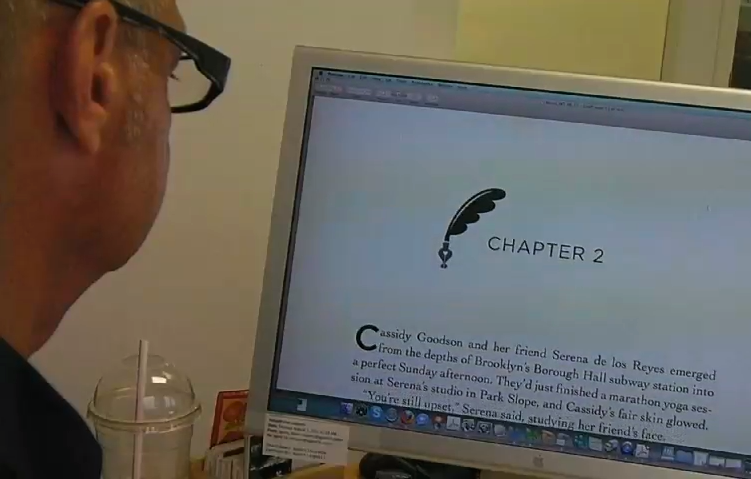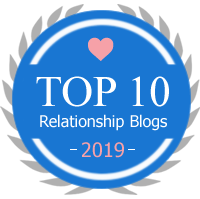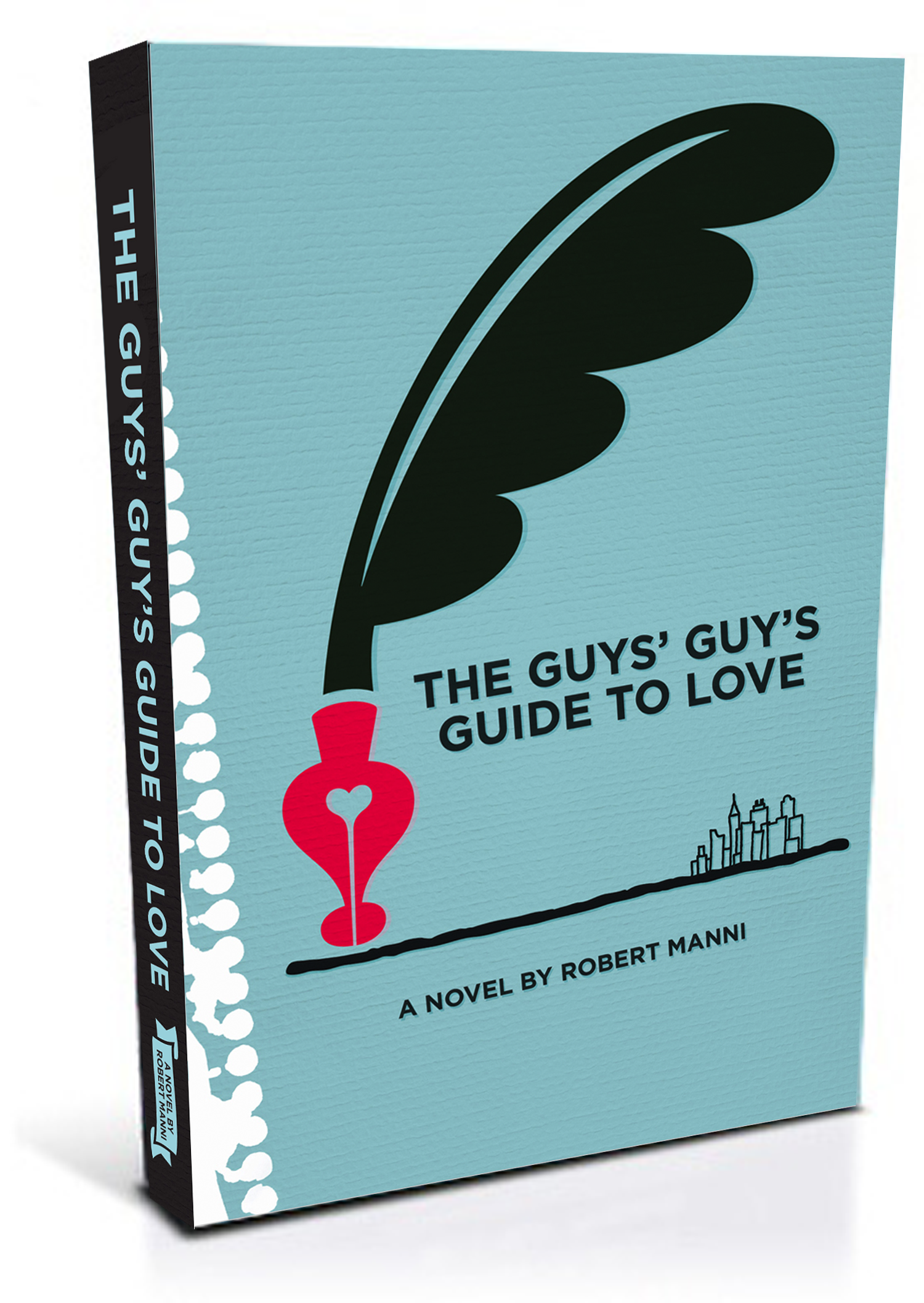Interview with Robert Manni (Part Two) – by Matthew (The Bibliofreak)

It’s hard to place The Guys’ Guy’s Guide to Love in a particular genre – how do you describe it to people?
Great question. At first agents told me that since I was a guy, I should write a thriller. No, thanks. Then it was, why don’t you write the book with a female protagonist? No, thanks. Then they told me, the title sounds like the book is a non-fiction guide to getting laid. Why don’t you change the name to Shark Tank or something like that? No, thanks.
Maybe this book will help guys connect with women better. I don’t know, but I write what I’m passionate about and the story is universal. Most readers can relate to Max, Roger, or Cassidy, so I don’t see why the book must be squeezed into a specific genre beyond general fiction. Once you start chasing the market, you’ll end up writing about a stripper-turned vampire detective. If you write what’s hot – like young adult or Harry Potter – they’ve already seen it. If you write something new, they don’t know where to slot your work. The market keeps evolving, but good stories about human nature with conflicts and choices characters face never go out of style.
Do you have any plans to write further novels set in the world of advertising, or even to revisit the characters in The Guys’ Guy’s Guide to Love?
Definitely. I have a fresh concept for the sequel in the works. I can’t wait to jump into it head first. I’m not done with the world of advertising yet, either. There are other issues and subjects I plan to tackle, though I’m just getting warmed up.
How long did it take you to write The Guys’ Guy’s Guide to Love?
The initial draft took about six months. The editing of this novel took over two years to get right.
Describe your life during the writing process.
I wrote GGG2Love during a period of career and personal transition. From working in a high-powered executive position, I went free – lance. I was single for the first time in many years and I was also introduced to energy work. Everything was open – ended. I did not know where the process would lead, but I had faith. This period of time tested me.
I learned that writing is psychically draining and cathartic and exhilarating all at the same time. I ran many, many miles and used that time to mentally sort out and sculpt a muscular plot for the book. I was spending a lot of time at my beach house. I was so deep into the writing process that on some days I would begin my work in the early morning. Then after what seemed like only a few hours later I’d find myself looking out at the ocean noticing that the sun was going down. It was a special time for me.
And when you’re not writing?
I’m president of a boutique ad agency in Manhattan so that keeps me hopping. I also read, write, play and rest. Of course, I spent a lot of time dating or chasing women in an effort to find the right partner.Thankfully, I finally swam into her net. It was a gentle capture. I was ready.
What first inspired you to start writing?
Once I realized that I would not be playing centerfield for the New York Yankees, at a young age writing became my primary passion…that is until I discovered girls. Although I spent my childhood playing outdoors, I read constantly – early mornings, evenings, and quiet afternoons sitting on the front steps.
I wrote a short memoir about our school baseball team when I was sixteen. My teacher, Cosmo Ferraro, read passages from my short book to his students and they loved hearing about their classmates. And that was it. I was all in – hook, line and sinker.
I majored in English Literature, but like my father I was interested in business and world travel. After graduation I worked my way into a marketing position at a corporation and took classes for my MBA. During this time I travelled extensively for business – across the U.S. and globally during a time when the world didn’t feel so connected by technology. I recall how alienated I felt having dinner in a colleague’s backyard in a suburb in Kuala Lumpur when three weeks prior I had never uttered the name of this wonderful city. I think that all the travelling I did early on provided a strong foundation to better understand the human condition with all of its ticks.
What do you hope readers will get from The Guys’ Guy’s Guide to Love?
I hope they have fun and are reminded that by giving give people a chance, you open yourself up to surprises. Or not. It keeps life interesting, and of course I hope they become aware of Reiki, too.
Which authors, if any, do you compare yourself to, or aspire to emulate?
I admire so many authors – Mailer, Hesse, Camus, Carlos Castaneda, Hemingway, William Hjortsberg, Dan Wakefield, John Fante, Lawrence Block, Sogyal Rinpoche, even Harold Robbins, but I don’t attempt to emulate them. It’s challenging enough for a writer to find his own voice.
The Guys’ Guy’s Guide to Love is your first novel; did you attempt any other full length works or short stories before you started writing it?
I wrote a “practice” novel like many other writers and shopped it around a bit to learn the ropes of the marketplace and how the business worked.
How successful were they / What did you learn?
The entire process was an education so I consider it a major success.Thich Nhat Hanh wrote about the wonderful experience of writing a book about one’s life and he was right. I had a powerful emotional release after completing that project. It taught me about possibilities. It also reminded me that story is paramount and my life was not necessarily as interesting to others as it is to me.
What aspects of writing do you find most challenging?
An editor who read both my first project and GGG2Love told me that I had a unique voice that the publishing industry might try to change. He urged me to stay true to my personal style.
I find the publishing industry challenging. The agents and publishers are inundated with material that is not ready for prime time. So some agents begin their process from a negative perspective. Reading takes time and time is money, so you can’t really blame them or take their feedback personally. Your writing needs to follow the rules, yet stand out. It’s tricky.
What advice would you give to people wanting to write?
Writing is not a matter of wanting. That takes no effort. To succeed at it, it must be something you have to do – almost a compulsion or an addiction of sorts. Otherwise, it’s too easy to give up. A writer must be driven, passionate, and relentless like a sled dog mushing his way through a blizzard. Onward!
What are you working on at the moment?
I’m now blogging regularly at robertmanni.com while prepping the sequel to The Guys’ Guy’s Guide To Love. I like the spontaneity of posting things that I’m experiencing, noticing, and feeling while hopefully adding value to the readers’ passions about life, love and their pursuit of happiness.
What are your long-term writing ambitions?
Do you mean beyond selling enough books to buy my own Caribbean island and building an amazing writing hideaway? There has been already interest in the TV treatment and film rights so we’ll see where this takes us.
What sort of books do you enjoy / Favourite authors or titles?
My all-time favorite book is Siddhartha by Herman Hesse. I read it every few years or so. The message remains constant, but the story touches my heart in a different way every time.
Are there any new writers you’ve read recently who you are particularly excited about?
I’m not sure if they are considered new, but I really enjoyed Rex Pickett’s Sideways and I think Michael Lewis is brilliant. I also loved Keith Richards’ autobiography.
What, if anything, would you change about writing and publication of The Guys’ Guy’s Guide to Love?
Like most writers, every time I go back and read the book I see things that I’d like to play with. But I’ve made the tweaks after the first short run, so the story is set and I have to let it go.
Favourite word, and why?
Om. It is the last word in Siddhartha and it means everything.







